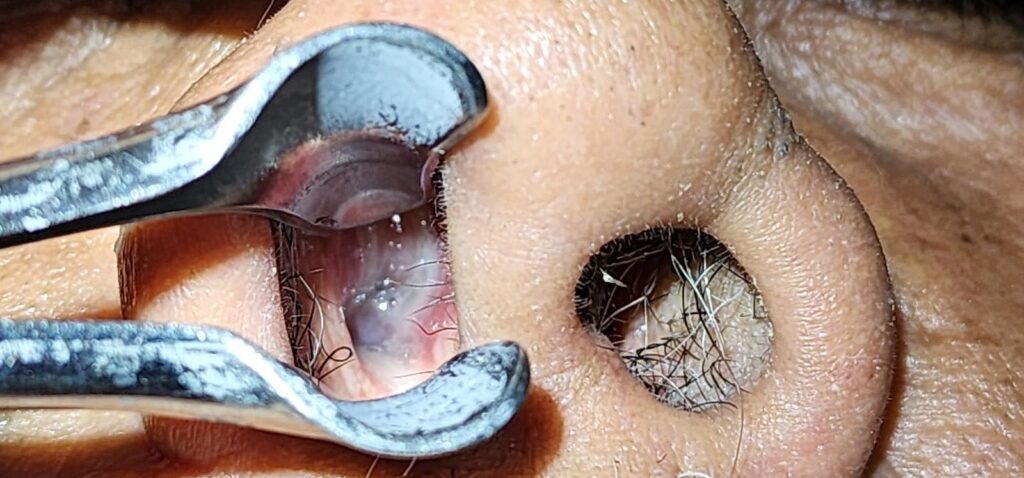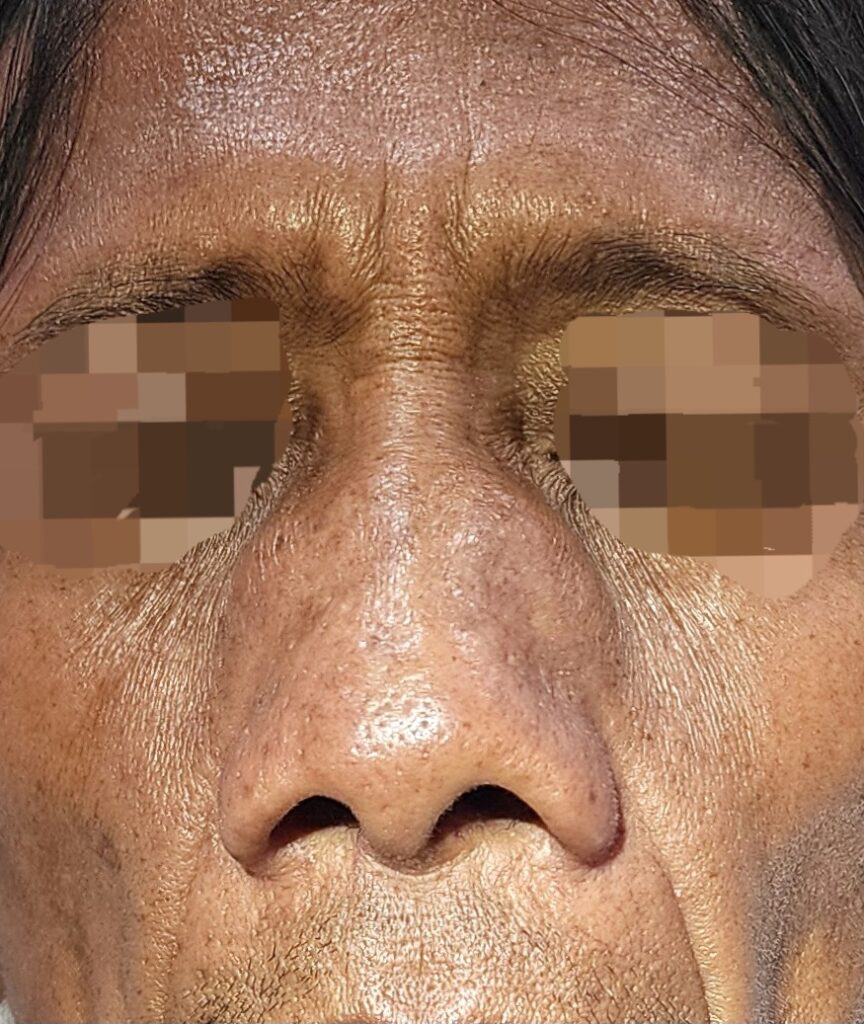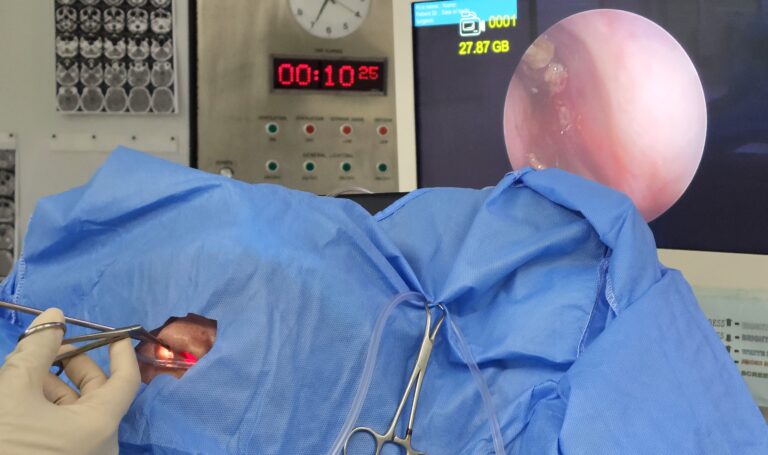
What Are Nasal Polyps?
Nasal polyps are benign growths that develop in the nasal passages or sinuses, taking on a teardrop shape. Despite being non-cancerous, these soft and painless swellings can obstruct nasal airways, resulting in symptoms such as congestion. When observed, they appear as grayish, grape-shaped growths in the nasal cavity. The surrounding nasal tissues are often chronically inflamed, sometimes pale or grayish, and edematous.
The severity of nasal polyps is sometimes assessed using the Meltzer grading system, ranging from 1 to 4. This grading system categorizes nasal polyps into four stages based on their size and impact on the nasal passages. In Grade 1, polyps are small and confined to the nasal cavity, while Grade 4 represents the most advanced stage with large polyps significantly obstructing the airways.
What are the causes of nasal polyps?
While the precise cause of nasal polyps remains unclear, inflammation, chronic infections, and allergies are often implicated. Theories suggest an abnormal immune response and genetic factors may contribute to their development, emphasizing the complex nature of this condition.
Nasal polyps might form due to various factors, both outside and inside our bodies. External factors like fungi and certain bacteria can cause an intense reaction from our immune system. On the inside, issues like low vitamin-D levels and changes in our immune system can play a role.
A common idea is that there’s a problem with our body’s protective layer in the nose, allowing invaders to get in more easily. This leads to a specific immune response, involving certain cells and substances, eventually causing the development of nasal polyps. Think of it like a defense system malfunction that allows the wrong things to get through and causes these growths in the nose.
What are the signs and symptoms of nasal polyps?
Nasal polyps exhibit a range of symptoms, including persistent nasal congestion, making breathing difficult and diminishing the sense of smell. This may result in loss of taste as well. Individuals may also experience facial pain due to pressure in the sinuses. Runny nose and postnasal drip are common manifestations. In cases of nasal blockage, a weak voice or nasal twang may occur.
In more severe instances, nasal polyps may lead to nosebleeds, intensified facial pain or sinus pressure, and headaches. Larger polyps can even alter the shape of the nose (see picture on the right with the classic Woakes sign). Patients may also complain of occasional snoring if nose blockage is accompanied by blockage of the oral airway. Additionally, they can contribute to issues like sleep apnea, further highlighting the diverse and potentially impactful range of symptoms associated with nasal polyps.

How are nasal polyps diagnosed?
During a physical examination by an ear, nose, and throat specialist, the healthcare professional carefully assesses the nasal passages and sinuses to identify the presence and characteristics of nasal polyps. Your ENT doctor may use instruments, such as a nasal speculum, to get a closer look at the inside of the nose and evaluate any signs of obstruction or abnormal growths. A diagnostic nasal endoscopy may be recommended if the polyps are small.
Diagnostic tests, especially non-contrast CT scans of the nose and paranasal sinuses, are commonly requested by your ENT doctor to provide a detailed view of the nasal anatomy. These scans offer a comprehensive understanding of the extent and location of nasal polyps, helping in treatment planning especially in surgery. Overall, combining physical examinations with diagnostic imaging ensures a thorough and precise assessment, resulting in an appropriate treatment approach for individuals with nasal polyps.
Treatment for Nasal Polyps
Treatment options for nasal polyps encompass lifestyle changes, such as avoiding food and airborne allergens. For individuals with allergies and polyps, a “bad allergy day” can cause polyps to swell, exacerbating symptoms. Conversely, treating allergies can often lead to polyp shrinkage and relief from nasal blockage. Medications, including corticosteroids, are employed through tablets or through nasal sprays to decrease inflammation and reduce polyp size.

In severe cases, or when medical treatment fails, surgical removal may be considered, with Functional Endoscopic Sinus Surgery (FESS) being the preferred method. FESS is a surgical procedure that selectively removes diseased tissues using an endoscope and special instruments, preserving as much normal tissue as possible.
Despite surgery, there’s a risk of recurrence of the nasal polyps. Thus, it is important to still follow up with your ENT surgeon for preventative measures such as irrigating sprays and steroid treatments to decrease the chances of polyp recurrence, and possible repeat surgery.
How to Avoid Nasal Polyps?
Preventing nasal polyps starts by effectively managing allergic rhinitis and asthma, as these conditions can contribute to the development of nasal polyps. Introducing a humidifier is beneficial, particularly in environments exposed to cold and dry air, as nasal passages thrive in a well-moisturized setting. Prioritize regular cleaning in both the workplace and at home to minimize potential irritants and allergens.
Always do routine check-ups with an ENT doctor near you. Your ENT doctor will manage any allergic or non-allergic rhinitis you have so this does not progress into nasal polyps. By addressing underlying conditions, practicing good nasal hygiene, and embracing preventive measures, you can significantly reduce your risk of developing nasal polyps. Early management helps you have better nose health and avoid complications or surgeries which are necessary when polyps are more severe.
Experience expert ENT surgical care tailored to your needs.
Book now to schedule your appointment with a skilled ENT surgeon near you and take the first step towards a healthier you.
Your well-being is our top priority.

